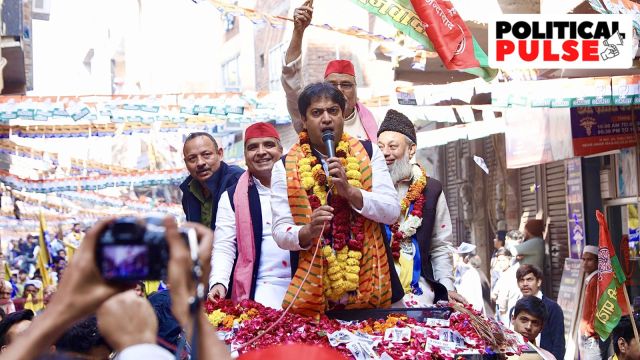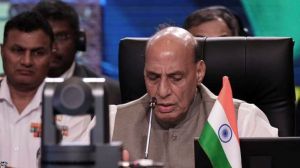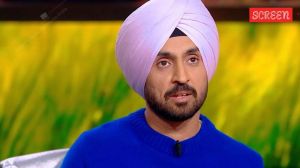With the incumbent Aam Aadmi Party (AAP) facing a stiff challenge from the principal Opposition BJP in the February 5 Delhi Assembly elections, the Muslim vote has emerged as a key factor in the polls, even as the Congress is going all out to woo back the minority community.
The AAP has fielded Muslim candidates in five seats including Matia Mahal and Ballimaran in Central Delhi, Okhla in South East Delhi, and Seelampur and Mustafabad in North East Delhi. The party had nominated Muslim faces in these five Muslim-dominated constituencies in the 2020 polls too, when all of them won their seats with huge margins.

Along with Dalits and jhuggi-jhopdi or slum cluster residents, the Muslim community, which accounts for about 13% of Delhi’s 1.55 crore voters, played a key role in ensuring the AAP’s sweep in the 2015 and 2020 Assembly polls, when the party had bagged 67 and 62 seats out of 70, respectively.
Story continues below this ad
Prior to the 2015 polls, the Muslim voters were considered part of the Congress’s formidable support base in Delhi that fuelled the party’s victory under Sheila Dikshit’s leadership for three consecutive terms during 1998-2013.
While the prominent parties had nominated altogether 16 Muslim faces in the 2020 Delhi polls, this time they have doubled this tally to 32, with various smaller parties also fielding several Muslim candidates while eyeing a share in the community’s vote.
In the 2020 polls, the Congress had fielded only five Muslim candidates – in the same seats where the AAP’s Muslim faces emerged as the winners. The Congress’s vote share was very low in these seats barring Seelampur where it got 15.61% votes. The party had failed to open its account in the polls, repeating its 2015 rout.
In 2020, the BSP had put up Muslim nominees in three seats, with the NCP, RJD and Shiv Sena fielding Muslim faces in one seat each.
Story continues below this ad
This time, the Congress has fielded Muslim candidates in seven seats, including five from its 2020 line-up as well as Babarpur in North East Delhi and Jangpura in South East Delhi.
Of the AAP’s five Muslim candidates, three are new faces fielded from the Matia Mahal, Seelampur and Mustafabad constituencies. Mustafabad was one of the worst-affected belts in North East Delhi which was hit by riots in February 2020 in which at least 53 people were killed. The three dropped Muslim MLAs from the AAP are part of its 20 sitting legislators whom the party has denied ticket this time in a bid to counter anti-incumbency.
The BSP, which is currently contesting 68 seats, has nominated Muslim faces in five seats — Tughlaqabad, Adarsh Nagar, Sangam Vihar, Rithala and Laxmi Nagar, which have significant presence of Muslims. The party had drawn a blank in 2020.
The Asaduddin Owaisi-led AIMIM, which had not contested the previous Delhi polls, has fielded two candidates this time – Shifa-ur-Rehman in Okhla and Mohd Tahir Hussain in Mustafabad.
Story continues below this ad
A former AAP councillor, Tahir was in jail over his alleged involvement in the 2020 Delhi riots, for which he was also expelled by the AAP. He is now out of prison on a six-day custody parole granted by the Supreme Court to campaign for the Delhi polls.
Shifa-ur-Rehman, former president of the Jamia Millia Islamia Alumni Association, was also in jail in connection with the 2020 Delhi riots and has been granted a five-day custody parole by a local court to contest the Delhi polls.
In Okhla, which has 52% Muslim population, the AAP has retained its sitting MLA Amanatullah Khan, who had won the seat in 2015 and 2020 with big margins. The Congress has pitched its councillor Ariba Khan, daughter of former party MLA from Okhla Asif Mohammad Khan, against Amanatullah.
The Muslim vote has traditionally been decisive in determining the victor in the Okhla seat. Of 14 candidates in Okhla for the February 5 polls, 12 belong to the Muslim community, with only the BJP and the BSP fielding Hindu nominees there.
Story continues below this ad
With the entry of several well-known Opposition Muslim faces in the fray, especially those from the Congress, there are concerns in the AAP camp that a division of the Muslim vote may have an adverse impact on its poll chances in several seats and benefit the BJP.
Some other constituencies like Chandni Chowk and Badli also have significant Muslim voters, with state Congress chief Devendra Yadav contesting from the latter.
In 2015, the BJP had won just 3 seats including Mustafabad, which was attributed to a split in the Muslim vote. In that election, BJP candidate Jagdish Pradhan (35% vote share) had defeated the Congress’s Hasan Ahmed (31.68% votes) and the AAP’s Mohd Yunus (30% votes).
In 2020, however, when the Muslim community threw its weight behind the AAP’s Yunus, he won by garnering 53% votes with the BJP’s Jagdish Pradhan finishing runner-up with 42% votes. The Congress’s Ali Mehdi managed to get just 3% votes.
Story continues below this ad
In the upcoming polls, the AAP has replaced Yunus with Adeel Ahmed Khan, while the Congress has again fielded Ali Mehdi.
The Aazad Samaj Party (Kanshi Ram) led by Nagina MP Chandra Shekhar Aazad has fielded 14 candidates, including Muslim faces in four seats – Narela, Kirari, Sangam Vihar and Chhatarpur. As Muslims and Dalits are part of the ASP(KR)’s core base, the votes garnered by the party’s nominees may also have a bearing on the AAP’s prospects.
In order to consolidate its Muslim support base, AAP leader Arvind Kejriwal roped in Samajwadi Party (SP) president Akhilesh Yadav to campaign for his party in some areas in the national capital. Akhilesh recently joined Kejriwal in a roadshow in Outer Delhi’s Kirari, where he appealed to voters “not to waste their votes” and help the AAP to “wipe out” the BJP.
While the BJP has not fielded any Muslim candidates, it is relying on “drawing room baithaks” in its campaign in Muslim pockets. The leaders from the party’s Delhi unit minority morcha, along with their counterparts from other state party units’ minority wings, have been leading a muted campaign, especially reaching out to the women members of Muslim households in Okhla, Mustafabad and Seelampur.
Story continues below this ad
The Ajit Pawar-led NCP has fielded 23 candidates, naming Muslim faces in seven seats including Sangam Vihar, Matia Mahal, Chandni Chowk, Ballimaran, Badarpur, Janakpuri and Moti Nagar.
NCP national general secretary and Delhi in-charge Brijmohan Srivastava claimed, “Our aim is not to benefit or dent any party. NCP is contesting here without alliance to increase its political power in Delhi. All our candidates are capable and popular among people.”

































